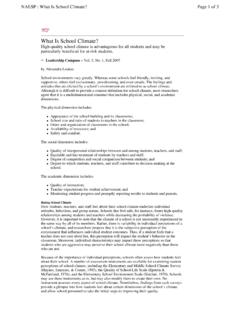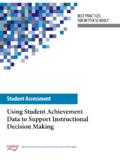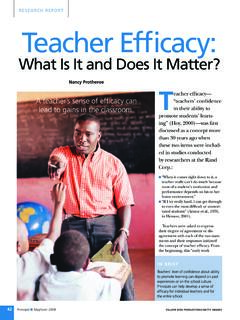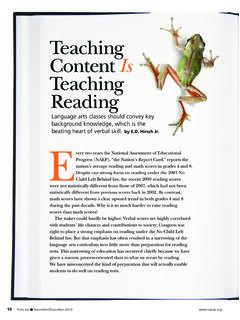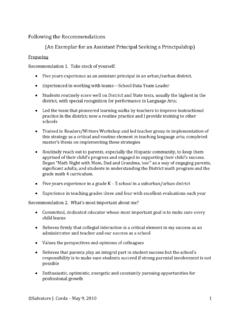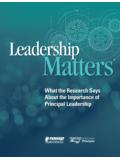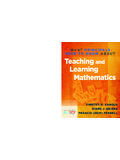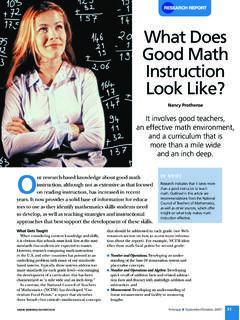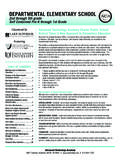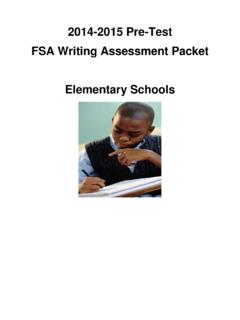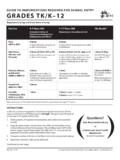Transcription of Leading Pre-K-3 Learning Communities - NAESP
1 Leading Pre-K-3 Learning COMMUNITIESCOMPETENCIES FOR EFFECTIVE PRINCIPAL PRACTICE1 National Association of Elementary school PrincipalsServing all elementary and middle-level principalsA Guide To Support the Essential Role of Principals in Creating Quality Learning Systems Leading Pre-K-3 Learning CommunitiesCompetencies for Effective Principal PracticeEXECUTIVE SUMMARYLEADING Pre-K-3 Learning COMMUNITIESCOMPETENCIES FOR EFFECTIVE PRINCIPAL PRACTICE3 EXECUTIVE SUMMARYN ational Association of Elementary school Principals1615 Duke , VA 22314-3483 Phone: 800-38-NAESPFax: 800-39-NAESPE mail: are the primary catalysts for creating lasting foundations for Learning .
2 Since 1921, the National Association of Elementary school Principals ( NAESP ) has been the Leading advocate for elementary and middle level principals in the United States and worldwide. NAESP advances the profession by developing policy, advancing advocacy and providing professional development and resources for instructional leadership, including specialized support and mentoring for early career principals. Key focus areas include Pre-K-3 education, school safety, technology and digital Learning , and effective educator evaluation.
3 For more information about NAESP , please visit NAESP administers the National Principals Resource Center, the American Student Council Association, and the President s Education Awards & American Citizenship Awards Connelly, Executive DirectorErnest J. Maninno, Deputy Executive DirectorKelly Pollitt, Associate Executive Director, Policy, Public Affairs & Special ProjectsCollaborative Communications Group, Vermont Avenue, , Ninth FloorWashington, DC 20005 Phone: 202-986-4959E-mail: is the nation s premier communications consulting firm focused solely on education andlearning.
4 Collaborative is dedicated to improving Learning systems, in and out of school , for students and adults, through communications, collaboration and for this publication were generously contributed by:VINCI Education Dr. Dan Yang, Founder and CEO and Kamar Shah, Chief Marketing National school Studios 2014 National Association of Elementary school PrincipalsinsideForward ..4 Early Childhood Education Benefits .. 5 Age Three to Grade Three: Rethinking the Early Learning Continuum ..6 State of Art: Pre-K-3 Research and Practice.
5 7 Elements of Effective Pre-K-3 Programs ..8 Call to Action ..9 COMPETENCY 1 Embrace the Pre-K-3 Early Learning Continuum ..10 COMPETENCY 2 Ensure Developmentally-Appropriate Teaching ..11 COMPETENCY 3 Provide Personalized Learning Environments ..12 COMPETENCY 4 Use Multiple Measures of Assessment to Guide Student Learning Growth ..13 COMPETENCY 5 Build Professional Capacity Across the Learning Community ..14 COMPETENCY 6 Make Schools a Hub of Pre-K-3 Learning for Families and Communities ..15 About This Guide.
6 16 NAESP Board Members, 2014-2015 ..17 Pre-K 3 Committee Members ..18 Methodology ..19 Leading Pre-K-3 Learning COMMUNITIESCOMPETENCIES FOR EFFECTIVE PRINCIPAL PRACTICE5 EXECUTIVE SUMMARYLEADING Pre-K-3 Learning COMMUNITIESCOMPETENCIES FOR EFFECTIVE PRINCIPAL PRACTICE4 How would early childhood education change the lives of 20 children living in poverty?Educational BenefitsLifelong BenefitsReady for school at age 5 Basic achievement at age 14Do not require special educationGraduate high school on timeGraduate high school /earn GEDFive more adultswould earn more than $2,000/month by age 27 Twice as many menwould raise theirown childrenFewer total arrestsby age 27(2.)
7 3 per person)Fewer lifetime monthsspent in prison(22 per person)Car ownershipwould increase by 37%Home ownershipwould increase by 32%46440 Collaborative Communications Group, Inc .Age 27 Age 40$25,000$20,000$15,000$10,000$5,000$0 Median Annual Earnings+20%+36%Preschool No PreschoolLeading Pre-K-3 Learning Communities embraces a vibrant vision that imagines a quality early childhood education for each and every child that is filled with play, creativity, early literacy and numeracy, music and art, physical activity and time to nurture, support and enhance each child s social and emotional growth.
8 This approach is critical to lay the foundation that fosters intellectual curiosity, personal responsibility and critical life skills. Creating an aligned continuum of research-based, age-appropriate standards and practices for the education of young children from prekindergarten through third grade, or age three to grade three, is the basis of the competencies developed by principals for principals as presented in this guide provides a framework to help principals create and support connections between the worlds of birth to five and K-12 and to help them implement developmentally-appropriate teaching and Learning practices to ensure successful Pre-K-3 continuums in their schools.
9 This Pre-K-3 continuum encompasses so much of what principals already believe, such as: Learning starts early and family engagement matters Supporting children to be prepared when they start school is essential to helping them get on the right track Developing early skills is fundamental to ensuring their future success Making sure children can read and do math by the time they leave third grade is essential to ensuring that they graduate from high school ready for college, careers and life Integrating the arts into Learning and developing the social.
10 Emotional and physical well-being of children enhances their academic achievementFor the policy maker, this guide provides a research base that demonstrates the enormous dividends children gain through investments in early education from age 3 to grade three. Children who have high-quality early Learning opportunities are less likely to encounter the juvenile justice system and more likely to graduate from high school . Further, research on early childhood brain development clearly demonstrates that a child s Learning through age eight relies on an array of educational experiences that educators must support through developmentally-appropriate practice, which will help close achievement gaps as children progress in the academic and opportunity gaps for children requires improving the knowledge and practice of principals and fully engaging families.
